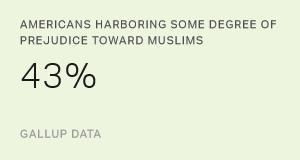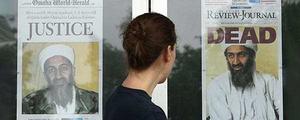The terrorist attack in San Bernardino, California, has brought the ongoing conversation about Muslim Americans, identity and extremism back onto the national stage. Over the past several years, Gallup has conducted a number of studies on perceptions of Muslims and Islam among the American public. Gallup has also studied the Muslim-American community itself in comparison to other religious groups in the U.S., most recently using 2015 Gallup Daily tracking data.
On Terrorism:
In the wake of the San Bernardino attack, an old debate about the so-called responsibility of Muslims to condemn acts of terror has gained steam. U.S. faith groups have historically been divided on whether Muslim Americans are more obligated to speak out against terrorism than other groups, with Muslims themselves also divided on the issue. Yet when it comes to their own views, Muslim Americans are the most likely of all religious groups to disavow military as well as individual or group attacks against civilians, with large majorities saying these are never justified.
On Prejudice:
Four in 10 Americans (43%) in previous Gallup surveys have self-reported harboring some degree of prejudice toward Muslims. Prejudice toward Muslims was higher than self-reported prejudice toward any of the various religious groups tested. Additionally, nearly half (or more) of respondents from all religious groups agree with the statement that "most Americans are prejudiced toward Muslim Americans." Muslims are also the most likely group among religious groups in the U.S. to report having personally experienced racial or religious discrimination.
On Loyalty to the U.S.:
While the debate about Muslim Americans' loyalty and role in countering extremism may highlight some of the public mistrust regarding Muslim Americans, nearly half (or more) of all religious groups in the U.S. recognize that Muslims do face considerable prejudice, and a majority of all groups say Muslims are also loyal to the U.S.
On Faith:
Gallup's research has shown that Muslim Americans identify equally with their faith and country.
On al Qaeda:
Additionally, a majority of all religious groups in the U.S. disagree with the statement that "Muslims living in this country are sympathetic to al Qaeda." Other than Muslims (92%), Americans with no religious affiliation (75%) and Jews (70%) are most likely to disagree with the statement that Muslim Americans harbor sympathies for al Qaeda.
On Confidence in U.S. Institutions:
Interestingly, Americans who think their Muslim peers are loyal to the U.S. are more likely than those who question this loyalty to have confidence in a number of major U.S. institutions such as the judicial system (63% vs. 41%), the honesty of elections (49% vs. 27%), the media (29% vs. 14%), the Federal Bureau of Investigation (73% vs. 61%) and the local police (82% vs. 75%).
This apparent deficit of confidence in national institutions among those who say Muslim Americans are not loyal to the U.S. is particularly interesting considering the current political discourse. In fact, government incompetence has been a major campaign theme of candidates, such as Donald Trump and Ben Carson, who have been most vocal on questioning the loyalty of Muslims and the compatibility of being a Muslim and a patriotic American. Statements implying that Muslims must reject their faith to run for president or should be treated with broad-brush suspicion in the country's immigration process have often come from campaigns whose major themes include a focus on distrust of government as well as government incompetence. Donald Trump's suggestion on banning all Muslim entry to the U.S. is presented based on the reasoning that government has failed at executing a more thorough and security-focused immigration process.
On the Possibility of a Muslim President:
Interestingly, 60% of Americans overall say they would vote for an otherwise well-qualified Muslim for president, statistically on par with the percentage who would vote for an atheist (58%) but lower than the percentage who would vote for a Catholic (93%), a Jew (91%), a Mormon (81%) or an evangelical Christian (73%).
On the Diversity of Muslims in the U.S.:
As the discourse in the U.S. continues to focus on Muslim identity, loyalty and Muslims' role in countering extremism, Gallup data reveal a Muslim-American population that skews young and is racially diverse.
A detailed analysis of the profile of 943 Muslims interviewed as part of Gallup Daily tracking in 2015 shows that Americans who identify their religion as Muslim are the youngest and most racially diverse religious group in the U.S. Some 42% of Muslims are 18 to 29, compared with 17% of Protestants and 19% of Catholics who fall into the same age bracket. At the other end of the age spectrum, only 4% of Muslims are 65 and older, compared with 24% of Protestants and 20% of Catholics. Muslims are the only religious group to lack a majority race or ethnicity, with 36% self-identifying as non-Hispanic black, 27% as non-Hispanic white, 21% as Asian and 8% as Hispanic.
On Muslims' Life Evaluations:
Muslim Americans' life evaluations are not significantly higher or lower than those of other religious groups in the United States. Data from the Gallup-Healthways Well-Being Index for 2015 show that 56% of Muslims rate their lives highly enough to be classified as thriving and 4% suffering, roughly the same as several other religious groups, with the exception of Jews, both within the overall community and among young adults. Jews have the highest thriving rates of any religious group, with 64% thriving and 2% suffering. By way of comparison, 55% of all Americans are thriving and 4% are suffering.
On Political Leanings of Muslims:
The political leanings of Muslim Americans also paint an interesting picture. At 66%, the percentage of Muslims who identify with or lean toward the Democratic Party is the highest of any major religious group, ahead of the 60% of Jewish Americans who identify as or lean Democratic. This contrasts with 17% of Mormons, 43% of Catholics and 39% of Protestants who identify as or lean toward the Democrats. On the other hand, Muslim Americans have the lowest percentage of any religious group who identify as or lean Republican, at 16%. By comparison, 31% of Jews, 72% of Mormons, 41% of Catholics and 48% of Protestants identify as or lean Republican.
On Religiosity:
Muslims' religiosity -- based on self-reported religious service attendance (42% at least weekly) and importance of religion (79%) -- is on par with Protestants' religiosity (41% and 81%, respectively), but is less than that of Mormons (87% and 66%, respectively), the most religious group in the U.S.
In the coming days, stay tuned for new Gallup data on the American public's perceptions of the threat of terrorism in light of the recent attacks.

